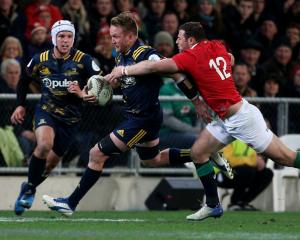Watching the Hurricanes capitulate is like a car crash you can't look away from.
I know I shouldn't listen to the gossip, hearsay and speculation, and yet I listen and read everything I can about a rugby franchise that is going through its own personal storm. As in an actual hurricane, some players have remained untouched, while others suffer the wrath of a coach on a mission.
It seems Mark Hammett's mission is to change the culture of the Hurricanes, because the one they have, according to him (and many others), isn't working.
There is nothing harder than changing culture. Culture is ingrained in tangible things like jersey colours and names, but it is predominantly invested in the intangibles; values, norms, morals, standards, protocols, expectations, and processes.
Every team has a series of life cycles, and Hammett is hoping to create some major shifts in mindset within one rotation of a teams life. Initially, individuals come together forming a collective.
Then there is a period of storming where boundaries are tested, values and protocols are established, and roles and processes are shaped. This is often a tumultuous time, and individuals tend to move towards or away from the boundaries that are set by either the coach, the players (as seems the case with the Brumbies), or a combination of both.
Once this shifting and shuffling settles down there is the norming stage of a team, which is analogous to the eye of the storm. Everything is relatively calm, the worst seems to be over, and the majority of players and management know and agree on their roles and responsibilities (at the least in order to achieve their collective mission).
It is assumed that the team is ready and able to perform at this stage, especially in a sport like rugby union where teamwork is sequential, and roles are blurred.
What tends to be forgotten, however, is that a team is organic.
At the end of every season a team adjourns and the faces around the changing room are very rarely the same year in and year out. As a result, this life cycle is continually repeated. The difficulty lies in knowing when consistency and stability become complacency and stagnation.
Like a receiver called in to save a down-and-out company, Hammett has been given the mantle of making some of the workers redundant. Not an easy task at the best of times, and definitely not easy when the workers/players you've decided to cull, are community icons and leaders.
What a task to give a reasonably inexperienced coach. This will either make or break his career.
One thing is for sure. He'll be known as a coach who draws a line in the sand and doesn't budge. Perhaps he'll get a reputation as a change agent/coach who goes around the world fixing troubled teams, when no-one else has the tenacity.
Rugby gives those who play it privileges and perks, but it doesn't make players immune to the cut-throat world of professional sport and the reality of job instability these days.
Andrew Hore and Ma'a Nonu will find other jobs, and they probably won't even have to look for long or consider retraining.
Hore seems to be resilient, has the family farm as his backup plan, and will be making cameo appearances for Taranaki while hoping for a Super rugby contract to come his way.
Nonu, who is a Wellingtonian through and through, appears to be suffering the sacking more publicly. Nonu should read Who moved my cheese? a book presented to me towards the end of my rugby career.
It's all about accepting that we own very little in this world, and are entitled to even less, and when we accept this we are liberated. I reckon Nonu will grow from this experience as a player and as an individual.
A different city, coach, context and community will surely bring about a change in perspective and incentive. Meanwhile, like most storms that have passed, there is the aftermath to deal with.
Hammett is struggling to get other players onside and he desperately needs commitment from players they'd like to hold on to.
He also needs someone to step up and take the leadership mantle, so that the life cycle of the team can continue as it should forming, storming, norming, performing and adjourning.






